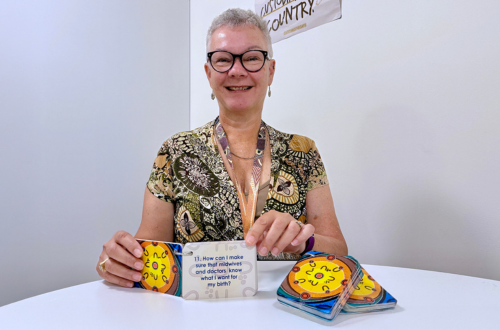New maternity discussion cards aim to empower Aboriginal and Torres Strait Islander women and families during their maternity journey.
The cards were co-designed by clinicians, researchers from Western Health and Deakin University and consumers, to provide women with a series of topics that enhance communication between women, their partners, and maternity care clinicians.
The purpose of the cards is to promote woman-led shared decision-making and address the barriers First Nations people can face accessing healthcare. 
'Aboriginal and Torres Strait Islander women and babies are more likely to have poorer health outcomes compared with non-Indigenous women and babies,' Research Fellow in Aboriginal Health Tanya Druce said.
Ms Druce, an Aboriginal woman from the Wiradjuri mob, said the cards are a key step in the journey towards improved self-determination in the delivery of maternity care.
'Culturally unsafe practices, racism, and the lack of shared decision-making can significantly affect health outcomes for Aboriginal and Torres Strait Islander women.'
Aboriginal-led design
Our Galinjera Program (Aboriginal and Torres Strait Islander Midwifery Group Practice) and the Koori Maternity Service played a key role in interactive workshops where the card content, language, format, and artwork were conceived, developed, and refined.
An Aboriginal-led approach also meant the catering, graphic design, and printing were provided by businesses owned by First Nations people. In addition, the workshops were held at Cooinda, an Aboriginal meeting place in Sunshine North.
These methods ensured that the maternity discussion cards were both culturally relevant and reflective of the needs of those they aim to serve.
59 conversation starters
Almost 60 topic cards were produced, including three blank cards that allow for personalised input.
Each card encourages discussions on various topics, including those that may traditionally be seen as difficult to address.
The focus areas include having a healthy pregnancy, labour and birth, and the baby's early weeks, with the cards developed from a strength-based approach to support and empower families.
The cards include questions like: How can I learn more about Aboriginal culture for me and my baby?
'By providing a structured yet flexible means of communication, these cards help to ease the apprehensions that often accompany sensitive conversations, enabling women to seek the information and support they need,' Ms Druce said.
Next steps
The maternity discussion cards are undergoing pilot testing by the Galinjera team, with women, their partners and clinicians.
Their feedback will be crucial for further refining the cards, which could be tailored to use in rural and remote settings across Australia.
The project was funded by a Western Health Nursing and Midwifery Research Grant.
The Western Health researchers include: Tanya Druce, Dr Vidanka Vasilevski, Cara Kennedy, Ann Hallett, Kara Edwards, Associate Professor Debra Kerr and Professor Linda Sweet.
Find out more
For more information, contact:
Ms Druce
Email: [email protected]
